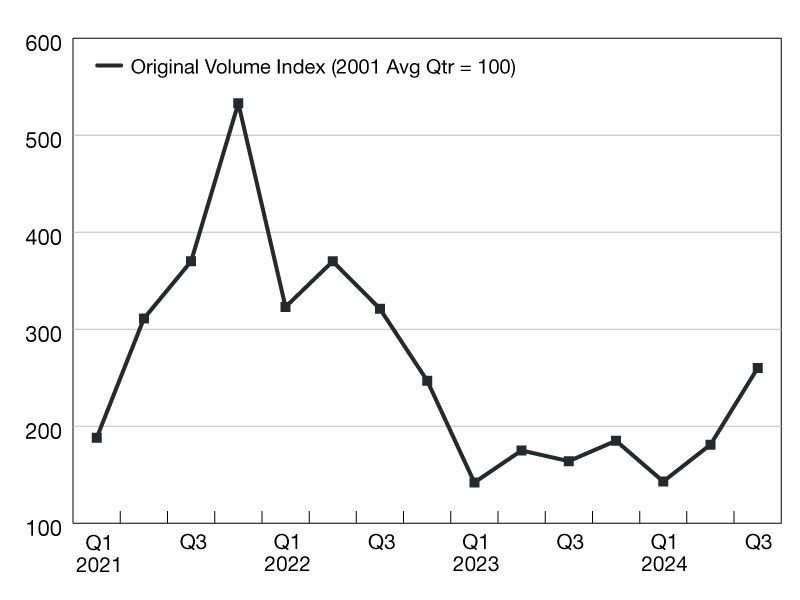When Craig Jones moved out of his West Seattle rental this summer, he expected to lose a bit of his security deposit for routine repairs and damage from his cat’s litter box.
But he was shocked when his landlord claimed flooring in the kitchen needed to be completely replaced and she planned to keep his entire $2,665 deposit in addition to roughly $1,400 in charges. Jones felt sure his family hadn’t done that level of damage and faced a familiar question for tenants: Can my landlord do that?
Tenant counselors and legal experts say disputes over security deposits are becoming more common as more Washingtonians rent their homes and more tenants move because of rent hikes. For some tenants, security deposits are key to affording the move into the next rental. Unpaid debts can make it harder to find future housing.
“Between a third and half of the calls we get are related to deposits,” said Neal Simpson, a spokesperson for Solid Ground, a Seattle nonprofit that runs a tenant hotline. “It’s definitely been going up.”
The disputes have inspired state lawmakers to look for ways to strengthen state law around tenants’ security deposits. But those efforts have failed to gain traction in Olympia. Meanwhile, tenant groups and attorneys are distributing advice for tenants.
Can the landlord keep my deposit?
When a tenant pays a security deposit, Washington law bars landlords from keeping any part of the deposit for “wear resulting from ordinary use of the premises.” Tenants are required to “restore the premises to their initial condition except for reasonable wear and tear.”
But the law does not define exactly what kind of wear is ordinary.
“We see a lot of charges for things that are indisputably wear and tear,” said Sarah Nagy, a staff attorney for Columbia Legal Services.
To help fight those kinds of charges, Nagy says, “take the move-in checklist very seriously.” Landlords collecting deposits must provide a checklist of the current state of the rental when a tenant moves in. Tenants should take careful notes and photos of any damage when they move in and keep a copy of that list.
When it’s time to move out, the landlord isn’t required to do a walk-through of the rental with the tenant, “but a tenant can always ask for one,” Nagy says. “If the tenant wants to fix things as much as possible, ask the landlord for specific things they can take care of.”
Take photos and videos once the furniture is moved out, and include the day’s newspaper in the photo as extra proof of the date. Document the age of the appliances. (Check appliances for the brand, model and serial number, then look them up on appliance411.com.) Handle all communications with the landlord in writing. And be sure to leave a forwarding address.
Landlords cannot withhold nonrefundable fees as part of the deposit, and the lease must explain fees that are nonrefundable.
Renter Dustin Cole learned that rule firsthand this summer when he moved out of the Jackson Apartments in the Central District.
The property management company, Greystar, withheld a $160 cleaning fee, arguing that because the property was professionally cleaned and sanitized when he moved in, he had to pay to have it professionally cleaned when he moved out.
Cole, an elementary school teacher, pushed back. He pointed out that the fee hadn’t been spelled out in his lease and was a nonrefundable charge that shouldn’t be withheld from his deposit. After repeatedly contacting Greystar and the building’s developer, Vulcan, Cole eventually got a refund.
“We have all these laws, but for typical people to utilize them is, like, impossible,” Cole said. “It was just a matter of principle for me.”
Greystar declined to make a representative available for an interview, but said in a statement tenants can avoid the cleaning fee if they pay to “have the unit professionally cleaned and sanitized and provide a copy of their invoice.”
After a tenant has moved out, the landlord has 21 days to refund the deposit or send an itemized list of why they are withholding any part of the funds. Landlords who fail to provide explanation within that time frame owe the tenant the full deposit.
As Jones, who moved out of the West Seattle rental, researched his rights, he realized his landlord had missed that 21-day deadline. Because of that, he argues, the charges are illegal. (In an email exchange with Jones, the landlord argued language in the lease allowing 30 days to respond supersedes state law. Jones argues the opposite. The landlord did not respond to Seattle Times emails seeking comment.)
Jones, who works for a nonprofit, said he felt fortunate to know how to reach out to resources for help. “I can only imagine how often this happens.”
Tenants trying to get deposit funds back from their landlord can send a demand letter before trying mediation or small claims court. The Tenants Union of Washington State has a sample letter on its website, tenantsunion.org/rights/deposit-negotiation.
Attempts to change law have stalled
Without a solid definition of ordinary wear and tear in state law, tenant advocates and state lawmakers have pushed for changes to the law.
A bill introduced during the last two years in the state Legislature, HB 1300, would have defined ordinary wear. The bill also would have required landlords to provide not just lists of the reasons they were keeping deposit funds, but also invoices or estimates to document the costs of repairs.
“If I’m being charged for something, I like to know what I am being charged for,” said Rep. My-Linh Thai, D-Bellevue, who sponsored the bill.
But landlord groups opposed the proposal and lawmakers failed to advance it.
Sean Flynn, president of the Rental Housing Association of Washington, argues the current system “works for the vast majority of people.”
Tenants have the right to respond to their landlord and dispute the charges, Flynn said. “I think the vast majority of security deposits are not disputed.”
“The way the bill was written effectively asks you to do cost accounting for every repair. The administrative expense of that is more than the repair,” Flynn said.
Tenants in a dispute with their landlord — whether about their deposit or something else — can try to seek a resolution in small claims court. “But very few are successful going that route and many are intimidated going that route,” said Rep. Nicole Macri, a Seattle Democrat who has worked on tenant rights bills in the Legislature.
Macri backed a bill earlier this year, HB 2023, that would have allowed tenants to seek a court order if they believed their landlord violated state law or the lease.
Landlords looking to evict tenants have a court process with specific timelines “but tenants don’t have similar recourse if the landlord violates the lease in some way,” Macri said.
Flynn argued court processes tend to be “expensive, bureaucratic and complicated.”
The bill would allow a tenant to petition a superior court for a hearing to make their case and allow the landlord to respond. If a judge sided with the tenant, the court could order the landlord to fix the issue, pay damages to tenants and take other steps. The bill didn’t move beyond an initial hearing in last year’s legislative session.
Lawmakers are likely to try both bills again in the upcoming session.
Jones remains in a tussle with his landlord about the more than $4,000 in disputed charges. Without any luck negotiating, he plans to seek mediation and, if necessary, go to small claims court.
But he wishes there were an easier way to settle the issue. “I know it can be a lengthy process,” Jones said.
















